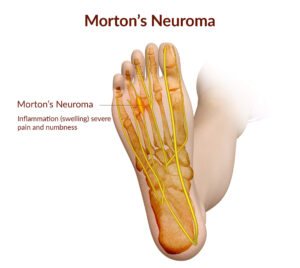 Morton’s neuroma is a painful condition affecting the ball of the foot, typically between the third and fourth toes. It occurs when the tissue around a nerve leading to your toes becomes thickened, causing pain, tingling, and discomfort. Although not a life-threatening condition, Morton’s neuroma can significantly affect your mobility and quality of life if left untreated.
Morton’s neuroma is a painful condition affecting the ball of the foot, typically between the third and fourth toes. It occurs when the tissue around a nerve leading to your toes becomes thickened, causing pain, tingling, and discomfort. Although not a life-threatening condition, Morton’s neuroma can significantly affect your mobility and quality of life if left untreated.
What Is Morton’s Neuroma?
Morton’s neuroma is a benign growth of nerve tissue that develops in the foot, often causing a sensation similar to standing on a pebble or having a fold in your sock. The condition is most common in women, likely due to footwear choices, and it typically affects those who frequently wear tight or high-heeled shoes.
Morton’s Neuroma Symptoms
The symptoms of Morton’s neuroma can vary but often include:
- Pain in the ball of the foot, especially while walking or standing.
- A burning sensation in the toes.
- Numbness or tingling in the affected toes.
- The feeling of having something in your shoe or under your foot.
Symptoms may worsen over time if the condition isn’t addressed.
Morton’s Neuroma Causes
The exact cause of Morton’s neuroma isn’t always clear, but contributing factors include:
- Footwear: Tight, narrow shoes or high heels that compress the toes can aggravate the condition.
- Repetitive Stress: Activities like running or sports that put pressure on the ball of the foot.
- Foot Shape: Flat feet, high arches, or other structural issues that increase stress on the nerves.
When to Call a Doctor
If you experience persistent foot pain or symptoms that worsen over time, it’s essential to consult a doctor. Early diagnosis and treatment can prevent the condition from becoming more severe.
Morton’s Neuroma Diagnosis
A diagnosis is typically made through a physical examination and imaging tests such as X-rays, ultrasounds, or MRIs to rule out other conditions.
Morton’s Neuroma Treatment
Treatment options range from conservative measures to more advanced interventions:
- Conservative Treatments: Rest, icing, anti-inflammatory medications, and shoe modifications can provide relief.
- Orthotics: Custom shoe inserts help redistribute pressure in the foot.
- Injections: Corticosteroid or alcohol injections can reduce pain and inflammation.
- Surgery: For severe cases, surgical removal of the neuroma may be necessary.
Why Choose Southwest Foot and Ankle Center?
If you’re dealing with Morton’s neuroma or chronic foot pain, the Southwest Foot and Ankle Center is here to help. With expertise in treating chronic foot conditions, our specialists provide personalized care and advanced treatment options to restore your mobility and comfort.
Contact Southwest Foot and Ankle Center today to schedule your consultation and take the first step toward pain-free living!
Contact us
Schedule an appointment
with our podiatrist by contacting us or calling our:
